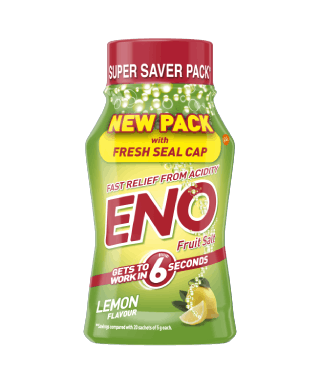Quick tips to control acidity
A life without acidity problems – that’s the dream! Unfortunately, the reality is that many of us have to deal with the nightmare of acidity at some point.1 But not to worry. Whether you’re at home, at work, at school, or even traveling, here are a few tips on how to control acidity as you go about your everyday life.
If you struggle with acidity, you are not alone. A staggering 25% of adults have acidity problems.1 At certain situations or places, symptoms like heartburn and acid reflux could be worse. For example, you might have experienced a bad heartburn during a particularly stressful day at work or even during bedtime at home.
If you lead a life with acidity, don’t worry, no matter where and when it strikes, there are simple things you can do to get relief. We’ve put together some great suggestions to help you control heartburn and acid reflux – and get back to enjoying life.1,2
How To Control Acidity At Home
While acidity symptoms can occur at any time, around 70% to 75% of people who have acidity problems say that they have heartburn at night.3
For most of us, the few hours after having dinner at night are precious – it’s one of the few times you get to relax and have time with your family or to yourself. So if you get heartburn and other symptoms of acidity, like reflux, it can be a real drag.
Many people also find heartburn disturbs their sleep,3,4 which can have a big impact on their mood and productivity during the day.4
The first thing to try if you have heartburn at night is to make a few changes to your diet and lifestyle. Here are a few handy tips that have been shown to help.

Eat 3 hours before going to bed
When you eat soon before going to bed, you’ll have a full stomach. This not only stimulates acid production, it may stretch and weaken the ring of muscle that holds the esophagus shut. You should also try to cut down on spicy or rich foods.1

Raise the head of your bed
Lying flat on your back makes it more likely for acid or acidic gas to rise up from your stomach. Raising the head of your bed by putting some blocks of wood or wedges of dense foam under the legs can help combat this.1

Sleep on your left side
People often ask which side is best to sleep on to reduce heartburn. The answer is the left! The entrance to the stomach is towards the right side, so if you lie on that side there’s more chance acid could leak out.1

Reach for ENO!
After a long day at work, or school, home is where you deserve to be at peace, and the last thing one’d expect to come knocking is acidity. But with Eno, let acidity out the door in less than 6 seconds*. As the old saying goes, ‘Eno on, Acidity gone’
How to control acidity at work
Unless you’ve won the lottery, you probably have to work for a living! While that’s fine – and work can even be very fulfilling – getting heartburn or acid reflux at work can really dampen your mood.
Like many people, you may find that stress, or a lack of sleep, can trigger your acidity symptoms or make them worse. Not eating well is another common cause of problems – let’s face it, sometimes we’re just too busy to have a proper break at lunchtime and eat something healthy, or we’re tempted by sweet snacks during the day.
Here are four simple ways to help avoid acidity symptoms at work.

Try some strategies to reduce stress
Keeping stress at bay may help reduce acidity problems. You could give some mindfulness or relaxation techniques a go, and try and get plenty of sleep. And don’t forget to make time for things you enjoy!5

Eat healthy snacks and lunches
Avoid fatty or fried foods, spicy foods, onions and garlic, tomatoes and tomato products, citrus fruits and chocolate – all of these may trigger acidity problems or make them worse.6

Don’t have too much caffeine
When you’re feeling a bit tired at work, a ‘hit’ of caffeine might seem like a good idea, but coffee, tea and other softdrinks or energy drinks that contain caffeine may trigger acidity symptoms.1,2

Refrain from smoking
There are plenty of good reasons to stop smoking, and avoiding acidity problems is one of them. Cigarettes could affect our digestive system, so the less you smoke, the better.1,2

Reach For ENO
Alright, you got tempted by those hot samosas, or took a few extra cups of coffee to keep yourself up and running. But that cannot come in the way of that afternoon presentation you have with your client or that long awaited catch up lunch you have planned with your friends. Relax, we got you covered. Take ENO, because it gets to work in just 6 seconds*.
How to control acidity at school or university
There’s no doubt that high school and university are more stressful than they used to be. The pressure of exams and assignment deadlines can make many students feel anxious. Add to that the long hours of study and it’s no wonder acidity symptoms are quite common.
So what can you do to avoid or reduce symptoms like heartburn and acid reflux? Here are some things to try.

Manage stress and anxiety
If you don’t feel in control, it’s easy to get stressed or anxious, so one of the best things you can do is make a study plan and try and stay organised. It’s also important to take some time out occasionally and make sure you get plenty of sleep.

Get yourself some healthy snacks
When you’re stuck at your desk, nibbling on snacks like potato crisps or chocolate bars seems to help break up the monotony. The problem is that fatty or fried foods and chocolate can trigger acidity problems, so try eating your favourite fruit (non-citrus) or nuts instead.7

Get some exercise
While you’re exercising your brain, it can be easy to forget to exercise the rest of your body. Exercise not only aids the digestive process, it can clear the head and help you maintain a healthy weight – so hop to it!8

Reach For ENO
We have all had that disturbing memory when the whole class goes silent a moment before your stomach starts grumbling. Maybe you had too much coffee in the break, or probably the canteen samosas betrayed you. Now you have the whole class looking at you. Save yourself from the embarrassment, with Eno. Eno complements your body’s natural defence mechanism to fight acid indigestion, and gets to work in 6 seconds*.
How to control acidity when traveling
There’s nothing like travel to stimulate the senses and reinvigorate the soul. It’s no wonder it’s one of the most popular things people do, no matter where they live around the world.
Unfortunately though, travel can have a downside. Moving into different time zones, disrupting your usual routines and eating different foods can all lead to digestive upsets, including heartburn and acid reflux.
With a little planning and by following these tips, you can minimise the chances of having acidity problems ruin your travelling experience.

Do Your Research
While you’re planning your itinerary, find out about the local cuisine too. Trying different foods is part of the travel experience, but if there are ones that you know contain ingredients that will trigger acidity, such as onions, garlic or tomatoes, it’s best to avoid them.

Eat Healthy Snacks
When you’re out and about, grabbing some fast food or buying a pre-packaged snack is certainly convenient… but these foods are often high in fats or fried, which can cause acidity.1 Look for healthier alternatives, like salads, fresh sandwiches, fresh and dried fruits (non-citrus) and granola bars, or bring them with you.

Don’t forget to take ENO in your travel fanny pack
Go ahead and don’t stop that wanderlust in you from exploring new places and more importantly, the local cuisine. But, in case, it leads to acidity, do not worry, we have you covered. Take Eno because it gets to work in 6 seconds*, and you can carry on with your explorations non-stop.

Avoid eating late
If you’re out sightseeing or enjoying the local culture, you can find yourself eating later than you would normally. Going to bed with a full stomach can lead to heartburn and acid reflux, so avoid this if you can.1

Drink alcohol in moderation
If you’re out having a good time, one or two drinks can easily turn into three or four (or even more!). Alcohol has been shown to affect acidity in a number of ways, so try and keep it to a minimum.2

Keep calm and carry on!
Even though travel is usually fun, you can sometimes find yourself in stressful situations. You might miss a transport connection or find the hotel you booked isn’t up to scratch. Stress can contribute to acidity problems,1,2 so try and stay calm and keep your problems in perspective.
What else can help control acidity?
If our lifestyle tips aren’t enough to help you avoid acidity symptoms, you may get relief from an antacid. Antacids are generally good to try before other treatments because they’re readily available from pharmacies and easy to use.
Antacids, like Eno, work by neutralising the acid in your stomach (gastric acid) and they tend to provide relief very quickly.1

You should see your doctor if an antacid isn’t enough to control your symptoms or if your symptoms worry you. Your doctor may prescribe other medications or do some tests.
Where to find out more
If acidity symptoms are getting in the way of your everyday life, we hope we’ve been able to help.
For those times when you still get symptoms, it may be worth trying an antacid like ENO to get quick relief. You can find out about how ENO can help here.
Please remember to see your doctor if you have persistent or particularly severe symptoms.












